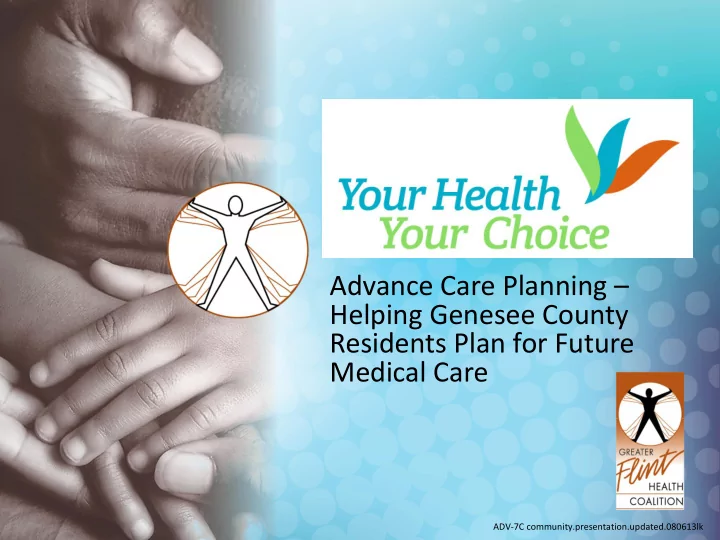

Advance Care Planning – Helping Genesee County Residents Plan for Future Medical Care ADV-7C community.presentation.updated.080613lk
Advance Care Planning Planning now for future medical care… • Assures your values will be known • Helps those closest to you know what to do Planning now for future medical care…
Advance Care Planning is more than checking boxes on a form and signing a document such as a “living will.”
Advance Care Planning Planning takes time to… • Understand your future medical options • Reflect on how your values and goals can guide decisions • Talk and discuss with those closest to you (family and friends), your physician, and others
What does every adult need to plan for? No one can predict when a sudden accident or illness may occur that would leave you unable to make your own healthcare decisions
Advance Care Planning Basic Advance Care Planning includes 3 decisions: 1. Who would you want to make medical decisions for you if you couldn’t make them yourself? 2. What would be the goals of treatment if you permanently lost the ability to meaningfully know who you were, who you were with, or where you were? 3. Do you have any religious, personal, or cultural views that would affect your treatment choices?
Advance Care Planning The person you pick to make your medical decisions for you is your “ patient advocate .” This person should be: • Someone you can talk to and discuss your values and goals • Willing to accept the role • Able to follow your wishes • Able to make decisions in difficult situations
Think about your experiences with family or friends who became seriously ill or injured. What were those experiences like? What did you learn from those events?
Advance Care Planning Consider… • You have a sudden, unexpected medical event (a car accident, heart attack, stroke, or a complication from an illness) that leaves you unable to communicate… • You are unaware of who you are, those around you, and your surroundings… • The doctors believe there is little chance you will ever recover the ability to know who you are or those around you…
Advance Care Planning Your Choice? • Would you want life-sustaining treatment to continue as long as possible? • Would you prefer to have your care focused on keeping you comfortable without using medical interventions to keep you alive? • Would you want life-sustaining treatment until your physicians determine you are permanently unconscious?
Spend time reflecting on: • How can you help your loved ones make this decision? • What does “quality of life” mean to you? • How can you talk to your chosen patient advocate and loved ones ?
Advance Care Planning Your Health Your Choice can assist you in putting your wishes in writing. Trained Certified Advance Care Planning Facilitators are available to help you: • Review how to select a patient advocate • Direct you to information and resources for understanding your health and clarifying your values and goals • Create a written plan (known as an advance directive or durable power of attorney for health care)
Advance Care Planning For an appointment with a facilitator or information on advance care planning contact: (810) 232-2228 YHYC@flint.org (810) 424-2270 (810) 262-2770 (810) 342-2546 YHYC@genesys.org YHYC@hurleymc.com YHYC@mclaren.org
Advance Care Planning Educational materials are available to assist you with advance care planning and discussing your wishes and values with your loved ones.
Advance Care Planning Once planning is completed, for your advance directive to be legal : 1. You must sign the document 2. Your signature must be witnessed by 2 qualifying adults 3. Your patient advocate must sign the acceptance form
Advance Care Planning When your written plan is completed provide copies to : • Your patient advocate(s) • Other family members • Your physician(s) • The hospital you use • Others? And talk to these individuals!
Advance Care Planning Review and Update the Plan Your plan should be reviewed every time you have an annual physical exam or whenever any one of the “Five D’s” occurs: 1. When you start each new DECADE of your life. 2. Whenever you experience the DEATH of a loved one. 3. When you experience a DIVORCE or other major family change. 4. When you are DIAGNOSED with a serious health condition. 5. When you experience a significant DECLINE or DETERIORATION of an existing health condition, especially when you are unable to live on your own.
Advance Care Planning If you have a serious illness… • Consider developing a more detailed plan that includes an understanding of how your illness will likely progress and what specific treatment decisions may be necessary • Begin talking to your health provider early so you have plenty of time to learn about your condition and make decisions
Advance Care Planning Consider… • The benefits and burdens of likely treatments (like CPR, tube feedings, a ventilator) • What is important for you to live well • Who else do you need to talk to Contact a certified ACP facilitator for further assistance
Advance Care Planning Advance Care Planning provides you: • A better chance that your loved ones and health care providers will honor your wishes • A gift of love for those who will need to make decisions for you • Peace of mind for yourself and those you love
Advance Care Planning • Questions? For additional information contact:
Advance Care Planning Finding Peace of Mind for You and Those You Love Finding Peace of Mind for You and Those You Love
Recommend
More recommend